The Raw Diet for Jack Russell Terriers: Benefits, Risks, and Tips
This post contains affiliate links. This means I will make a commission at no extra cost to you should you click through and make a purchase. Read the full disclosure here.In recent years, the concept of feeding dogs a raw diet has gained significant popularity among pet owners. Advocates of the raw diet argue that it aligns with a dog’s ancestral diet, providing numerous health benefits. However, it’s essential to delve deeper into this dietary trend to understand how it specifically applies to our spirited and energetic companions, the Jack Russell Terriers.
This blog post aims to provide you with a comprehensive guide to the raw diet for Jack Russell Terriers. We will explore the benefits, potential risks, and offer essential tips for those considering or already practicing a raw diet for their beloved Jack Russells.
Understanding the Raw Diet
Before we dive into the specifics of a raw diet for Jack Russell Terriers, it’s essential to grasp the fundamentals of what a raw diet entails and how it differs from conventional commercial dog food.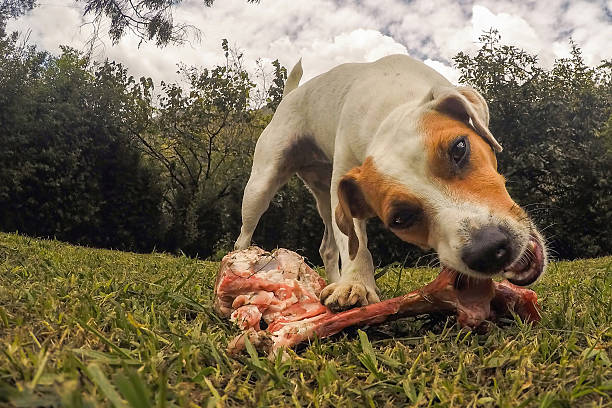
Explanation of the Raw Diet for Dogs
A raw diet, often referred to as a “BARF” diet (Biologically Appropriate Raw Food or Bones and Raw Food), is a feeding regimen that centers around providing dogs with unprocessed, whole foods in their most natural state. The core components of a raw diet include:
- Raw Meat: This is typically the primary protein source, which can include muscle meat, organ meat, and sometimes bones.
- Bones: Whole bones, such as chicken wings or beef ribs, are commonly included for their calcium content and dental benefits.
- Organs: Organ meats like liver and kidney provide essential nutrients, including vitamins and minerals.
- Vegetables: Some raw diets incorporate vegetables to offer fiber, vitamins, and minerals.
- Supplements: In some cases, supplements like fish oil, vitamins, and minerals are added to ensure balanced nutrition.
Key Components of a Raw Diet
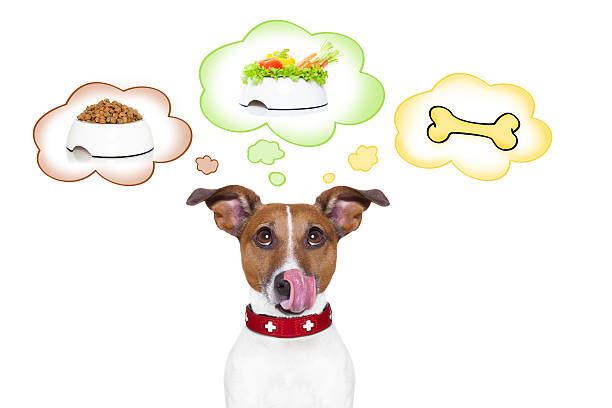
- Protein: Dogs require a substantial amount of protein for muscle development and overall health. The protein in a raw diet usually comes from meat sources like beef, chicken, turkey, and fish.
- Fat: Fat provides energy and supports healthy skin and coat. Sources of fat in a raw diet may include fatty cuts of meat and fish.
- Carbohydrates: While not a primary component, some raw diets include vegetables like carrots, broccoli, and spinach as sources of carbohydrates, fiber, and vitamins.
- Calcium: Essential for bone health, calcium often comes from raw bones included in the diet.
Comparison Between Commercial Dog Food and Raw Diets
One of the primary distinctions between commercial dog food and raw diets is the level of processing. Commercial dog food is typically cooked and processed to meet specific nutritional standards, while raw diets aim to mimic a dog’s natural, ancestral diet.
Benefits of a Raw Diet for Jack Russell Terriers
Feeding your Jack Russell Terrier a raw diet can offer several potential advantages that align with their specific needs and spirited nature. While individual dogs may respond differently, here are some of the key benefits reported by advocates of raw diets for Jack Russells:
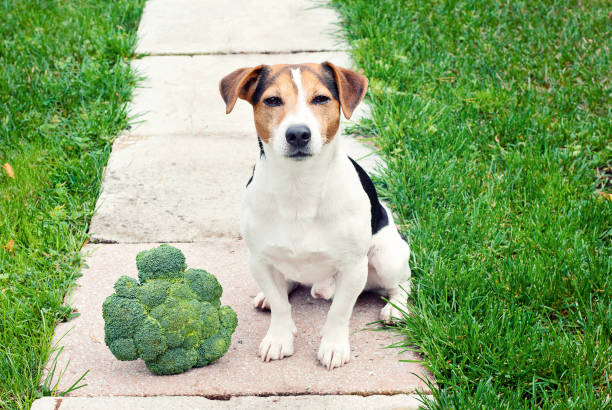
Improved Digestion and Nutrient Absorption
- Better Digestive Health: Raw diets can be easier for dogs to digest because they contain fewer fillers and additives commonly found in commercial dog food.
- Healthy Gut Flora: The absence of processed ingredients and the presence of natural probiotics in raw foods may contribute to a healthier gut microbiome, improving overall digestion.
Enhanced Coat and Skin Health
- Shinier Coat: Raw diets rich in essential fatty acids, like omega-3s, can promote a glossy and healthier coat.
- Reduced Skin Issues: Some Jack Russell owners report a decrease in skin irritations and allergies when their dogs are on a raw diet.
Increased Energy and Vitality
- Optimal Energy Levels: The high-quality proteins and balanced nutrition in raw diets can provide the energy Jack Russells need for their active lifestyles.
- Improved Muscle Tone: Adequate protein and nutrients support muscle development and maintenance, crucial for Jack Russell Terriers known for their athleticism.
Potential for Weight Management
- Control Over Portion Sizes: With raw diets, you have more control over portion sizes and can tailor your dog’s meals to help maintain a healthy weight.
- Reduced Risk of Obesity: Because raw diets typically contain fewer carbohydrates and fillers, there may be a reduced risk of obesity in dogs.
Potential Reduction in Allergies and Sensitivities
- Fewer Allergens: Raw diets often eliminate common allergens present in commercial dog food, which can be beneficial for dogs with food sensitivities or allergies.
- Less Artificial Ingredients: The absence of artificial preservatives, colors, and flavors in raw diets may reduce the likelihood of adverse reactions.
It’s important to note that while these benefits are often reported by raw diet enthusiasts, the effectiveness of a raw diet can vary from one dog to another. What works well for one Jack Russell may not be the ideal choice for another.
Risks and Considerations
While a raw diet for Jack Russell Terriers can offer several potential benefits, it’s essential to be aware of the associated risks and considerations. Making an informed decision about your dog’s diet involves understanding both sides of the equation: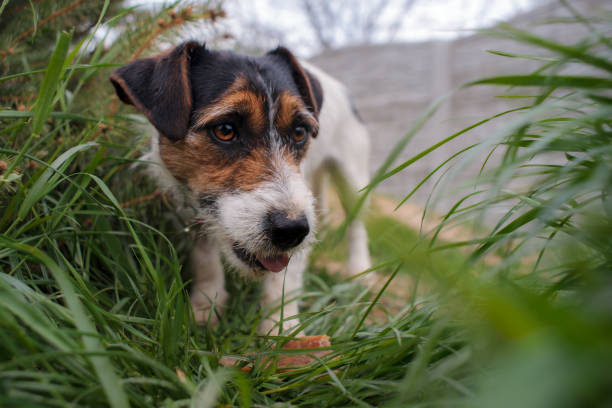
Bacterial Contamination and Food Safety
- Risk of Foodborne Illness: Raw meat can contain harmful bacteria such as Salmonella and E. coli, which can pose a health risk to both dogs and humans in the household.
- Cross-Contamination: Handling raw meat can lead to cross-contamination in your kitchen, increasing the risk of foodborne illnesses.
Nutritional Imbalances and Deficiencies
- Lack of Nutritional Expertise: Formulating a balanced raw diet requires a deep understanding of canine nutrition. Inadequate planning can result in nutritional imbalances or deficiencies.
- Calcium-Phosphorus Balance: Getting the right balance of these minerals, especially when including bones, can be challenging and may lead to orthopedic issues.
Dental Health Concerns
- Potential for Dental Injuries: While some proponents of raw diets claim that bones promote dental health, there is also a risk of broken teeth, oral injuries, or gastrointestinal obstructions.
- Incomplete Dental Care: Relying solely on bones for dental health may not address all aspects of oral care, and routine dental care should not be neglected.
Transitioning from Commercial Food to a Raw Diet

- Gradual Transition Required: Abruptly switching from commercial dog food to a raw diet can upset a dog’s digestive system. A gradual transition is often recommended.
- Consultation with a Veterinarian: It’s crucial to consult with a veterinarian before making the switch to ensure that your dog’s nutritional needs are met.
It’s essential to approach a raw diet for your Jack Russell Terrier with caution and a full understanding of these potential risks. One way to mitigate these risks is to consult with a veterinarian or canine nutritionist who can help you create a balanced and safe raw diet plan for your dog. In the next section, we’ll provide tips for those considering or already practicing a raw diet for their Jack Russell Terrier.
Tips for Implementing a Raw Diet for Your Jack Russell
Transitioning your Jack Russell Terrier to a raw diet requires careful planning and consideration. Here are some essential tips to help you make the switch smoothly and ensure your dog’s health and well-being:
Consult with a Veterinarian or Canine Nutritionist
- Professional Guidance: Seek the advice of a veterinarian or canine nutritionist who specializes in raw diets. They can assess your dog’s specific nutritional needs and create a tailored meal plan.
- Regular Check-Ups: Maintain regular veterinary check-ups to monitor your Jack Russell’s health and ensure they are thriving on the new diet.
Select High-Quality Ingredients
- Quality Matters: Choose high-quality, human-grade ingredients for your dog’s raw diet. Opt for lean meats, fresh vegetables, and high-quality supplements.
- Variety is Key: Provide a variety of proteins, including chicken, beef, turkey, and fish, to ensure a balanced diet.
Proper Handling and Food Safety Measures
- Food Safety: Practice strict food safety measures when handling raw meat to prevent bacterial contamination. Clean surfaces and utensils thoroughly after each use.
- Safe Storage: Store raw ingredients in the freezer to maintain freshness and prevent spoilage.
Monitoring Your Dog’s Health and Progress
- Watch for Changes: Pay close attention to your Jack Russell’s health, behavior, and appearance. Note any positive or negative changes after transitioning to the raw diet.
- Keep Records: Maintain a food diary to track your dog’s meals, portion sizes, and any unusual reactions or sensitivities.
Balanced Recipes and Portion Control
- Balanced Diet: Ensure your dog’s diet is well-balanced with the right ratios of protein, fat, and carbohydrates. Address their individual nutritional needs.
- Portion Control: Avoid overfeeding by following portion recommendations based on your dog’s weight, age, and activity level.
Remember that the transition to a raw diet is a significant change for your Jack Russell, and it should be approached with care and attention to detail. With proper planning, professional guidance, and vigilant monitoring, you can provide your beloved Jack Russell Terrier with a raw diet that supports their health and vitality.
The Importance of Patience and Understanding
Embarking on a raw diet journey with your Jack Russell Terrier requires more than just selecting the right ingredients and following a feeding plan. It demands patience, understanding, and a deep connection with your furry companion. Here’s why these qualities are essential: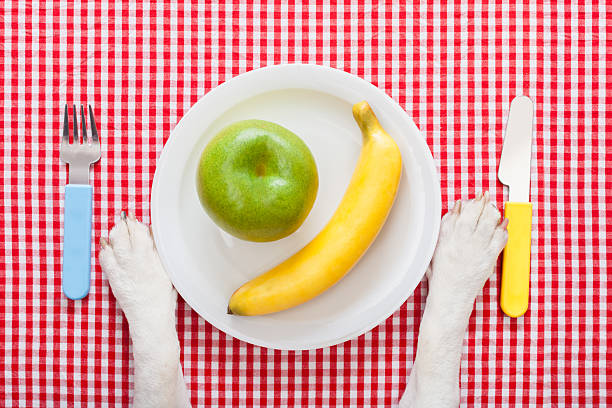
Emphasizing the Need for Patience
- Behavior Takes Time: Just like with any dietary change, it may take some time for your Jack Russell to adjust to a raw diet. Be patient as you transition and give them time to adapt.
- Health Improvements May Be Gradual: While some dogs experience immediate benefits, others may see gradual improvements in their health over time. Recognize that each dog is unique.
- Learning Curve: Both you and your dog are on a learning journey. You’ll need patience as you fine-tune portion sizes, recipes, and feeding routines to best suit your Jack Russell’s needs.
How a Deeper Understanding Benefits Your Relationship

- Strengthening the Bond: Mealtime is an opportunity to strengthen the bond between you and your Jack Russell. They learn to trust you as their provider, and you learn to understand their unique preferences and needs.
- Enhancing Communication: Observing your dog’s reactions to different foods and feeding routines can improve your communication with them. You’ll become attuned to their signals and preferences.
- Tailoring Solutions: Every Jack Russell is an individual with their own quirks and preferences. Through patience and understanding, you can tailor solutions and strategies that best suit your dog’s personality and needs.
Remember that raising a Jack Russell Terrier is an ongoing journey filled with joy and challenges. By embracing patience and understanding, you’re not only ensuring that your dog receives the best possible nutrition but also nurturing a deeper connection that will last a lifetime.
In the concluding section, we’ll recap the key takeaways about raw diets for Jack Russell Terriers and offer some final thoughts on this dietary approach for these spirited and loyal terriers.
Conclusion
In conclusion, the raw diet for Jack Russell Terriers is a dietary approach that has gained popularity among pet owners seeking to provide their energetic and spirited companions with a natural and potentially beneficial feeding regimen. Throughout this blog post, we’ve explored the various aspects of the raw diet, including its benefits, risks, and essential tips for implementation.












